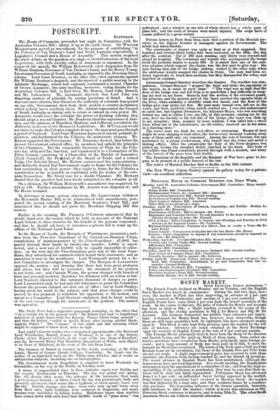POSTSCRIPT.
SATITE.DAY.
The Houee of Commons proceeded last night in Committee with the Australian Colonies Bill ; taking it up at the sixth clause. Sir WuxiAti Moutswairrn moved an amendment, for the purpose of establishing "in the Colonies of Van Diemen's Land and South Australia respectively, a Legislative Council and a House of Assembly." This motion reopened the whole debate on the question of a single or twofold structure of the local Legislature, with little novelty either of statement or argument. In the course of his speech, Sir Willi= Molesworth cited despatches from Sir William Denison, Governor of Van Diemen's Land, and Sir Henry Young, Lieutenant-Governor of South Australia, as opposed to the Downing Street scheme. Lord Joint Russmia, on the other side cited arguments against Sir William Denison's deepateli, and the report of a public meeting in the Adelaide Exchange, which had expressly condemned a second Chamber of Crown nominees; the same meeting, moreover, voting thanks for the Australian Colonies Bill, to Earl Grey, Mr. Hawes, Lord John Russell, and Mr. Labouchere. Mr. ADDERLEY objected, that Lord John was disputing matters of principle by raising questions of detail. And it was curious to observe, that whenever the authority of colonists was quoted cm one side, Government drew from their pockets a counter-declaration which nobody knew anything about. Mr. ANSTEY represented the Council of South Australia as aiming only to retain or extend its own power. Mr. AOLIONBY would leave the colonists the power of deciding whether they should adopt a second Chamber. Mr. ROEBUCK cited the experience of Ame- rica, and the opinions of Hamilton, Madison, and Jefferson, recorded in the Federalist, in favour of two Houses of Legislature. Mr. M'Cumdcon would not strive to make the Colonies complete at once : the manmust pass through aperiod of boyhood. Lord Jorne Msnainns deprecated minute pedantic le- gislation, and desiderated for the Colonies the aristocratic element. Mr. KEOGH supported the Government. Mr. DISRAELI showed, that before the present Government entered office, its members had upheld the principle of two Chambers. But the responsible Secretary of State for the Colo- nies has abdicated his function, and transferred it to a Committee of the Privy Council, consisting of a Chancellor of the Dutehy of Lancaster, [Lord Campbell], the President of the Board of Trade, and s retired Judge [Sir Edward Ryan]. Mr. HAWES contravened this representation ; and distinctly denied that Government ought to flame for the Colonies the best constitution in their power—they ought to frame for the Colonies a constitution as far as possible in conformity with the wishes of the colo- nists themselves. Mr. Seorr was for a double Chamber. Mr. Mowarr denied that the question had been freely submitted to the colonists at all.
On a division Sir William hfolesworth's amendment was negatived, by 218 to 150. FUrther amendments by Mr. ANSTEY were disposed of; and the House resumed.
In deference to many serious objections, Mr. Lsisoneirean withdrew the Mercantile Marine Bill, to be reintroduced with amendments; post- poned the second reading of the Merchant Seamen's Fund Bill ; and announced that he should not press the Merchant Shipping Bill this session.
Earlier in the evening, Mr. FEAROUS O'Cornion announced that he would hand over the money which he held on account of the National Land Scheme to three trustees for the benefit of the persons concerned ; and that he should ask leave to introduce a private bill to wind up the affairs of the National Land Fund.
In the House of Lords, the Marquis of WESTMRATI1 presented a peti- tion from the Poor-law Guardians of the Carrick-on-Shannon Union, complaining of mismanagement by the aVice-Guardians • 47,0001 has passed through their hands in twenty-one months ; 5,0001. is uncol- lected, and a new rate of 16,000/. will be equally impossible of collec- tion; on the very day the Vice-Guardians gave way to the local Guar- dians, they advertised for contracts which bound their successors; and an execution is now in the workhouse. Lord 'Westmeath moved for a Se- lect Committee to investigate the charges. The Marquis of LANSDOWNE opposed the motion : not denying that there had been great profusion and abuse, but they will be corrected ; the statement of the petition is not borne out ; and Captain Wynn, the person charged with breach of trust and personal motives, threatens his defamers with an action at law. Lord STANLEY objected to this summary dismissal of charges so grave. Lord LANSDOWNE said, he had only felt reluctance to grant the Committee because the persons charged are now out of office ; but as Lord Stanley, having given his mind to the subject, said that gross charges could be proved, he was prepared to withdraw his opposition to the motion and assent to a Committee. Lord STANLEY explained, that he knew nothing of the case except through the statements of the petition. The motion was agreed to.


























 Previous page
Previous page